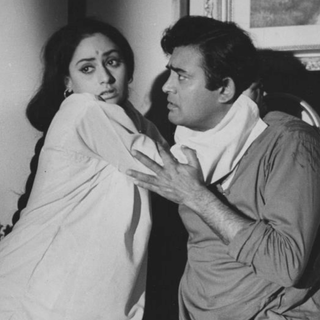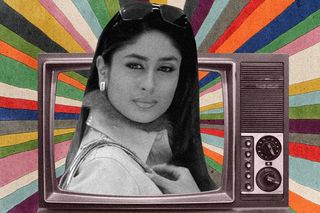
Can We Move on? From the Posh Girl Trope That Uses Privilege to Justify Misogyny
Silly, frivolous, and thoroughly misrepresented, the Posh Girl’s persona needs a retelling.

In Can We Move On, we revisit old tropes and question whether they have any remaining cultural relevance.
The most ubiquitous posh girl in Hindi cinema is Kareena Kapoor’s beloved portrayal of Poo in Kabhi Khushi Kabhi Gham. Poo was beautiful, hyper-feminine, hyper-trendy, equipped with devoted sidekicks, adoring male fans, and most importantly — was well-off enough to be able to make all of the above happen.
Poo’s presence in K3G, as the cult film is affectionately called, is primarily for comic relief. She’s pure camp and gets a delightful array of iconic catchphrases that millennials still hold dear to their hearts. Laughing at her is also comfortable — she’s a spoilt girl and of course gorgeous, so we’re certain there’s absolutely no way we’re punching down, unlike what it would be like to laugh at a hypothetical queer man with the same personality put in place as comic relief.
This particular easy ability to laugh at or mock privileged girls repeats itself in reel life and real life. Whether it’s laughing at how incredulous Shanaya, Shreya, and Mridula in their respective Student of the Year films are, or mocking the titular character in Aisha for her lack of real-world sensibility, or even cackling at the real-world brand of jokes centering the Bandra Girl/Town Girl in Mumbai and the South Delhi Girl in the capital — rich girls are easy bait, and we’re all loath to leave any opportunity to pick on those who cry rivers of diamonds.
It’s time to rethink the above. There is no doubt those with upper-class privilege can sustain a joke or 12 at their expense. Yet, the unique thing about the Posh Girl trope, in particular, is that it represents a heavily gendered stereotype of a silly and frivolous person whose only positive trait is her beauty. In comparison, posh boys are depicted as arrogant and cunning in the ways they use their privilege, not as idiots. It is only through spending time with the virtuous hero that posh girls understand previously alien terms like “kindness” and “empathy.” This way, the Posh Girl is merely a two-dimensional, porcelain symbol of privilege meant to be knocked down a peg and usurped by a man who simply knows better. However, the internal lives of posh girls are far, far more complex than what films would have us believe.
Sociologist Rachel Sherman set out to understand the lifestyles of rich women in elite New York communities and found that surprisingly many women in these communities felt the need to distance themselves from frivolous rich girl stereotypes and felt deeply anxious and guilty about their socioeconomic status. These women weren’t spoilt brats — they were women qualified and working in fields like finance, law, and medicine. From her interviews, Sherman highlights that meritocracy is heavily gendered, and “this means that women bear the brunt of negative judgments about wealth — and raises questions about what women ‘deserve,’ and on what basis, that cut across social class.”
In fact, the depiction of posh women or girls as silly dilettantes is actually a throwback to a more restrictive, misogynist past, in which women rarely worked for pay and frequently cut short education to get married early. However, with time and technology, perceptions of wealth changed from the more exclusive inherited wealth to that of the everyman who worked hard to make his billions — think Mark Zuckerberg or Steve Jobs. This particular moral imperative to ‘earn’ wealth bleeds into wealthy women’s psyche, too. Yet, they’re still seen as ‘gold diggers’ or frivolous elites, all by virtue of stubbornly persistent gender roles in society.
However, perceptions regarding the Posh Girl are slowly changing, considering the rapidly increasing influx of powerful, interesting women who helm their own companies and find themselves becoming successful, wealthy entrepreneurs. Beyond self-made women, other rich women like Abigail Disney and Mackenzie Scott, who came upon wealth under different circumstances, still find more acceptance than criticism about their IQ or social awareness. There’s still room for ample, complex critique of wealthy women, but accusations of silliness and frivolity rarely hold ground.
This openness to more fleshed-out personas of wealthy women finds itself reflected in reel life, too. Priyanka Chopra’s Ayesha Mehra in Dil Dhadakne Do is a quiet, dignified heiress with ample ambition and intelligence that allows her to lead her own travel start-up and later, her father’s company. Made In Heaven showcases several stories of wealthy women who both stand up for themselves against archaic gendered practices and fight to survive in the cutthroat elite society.
While the Poos and Shanayas of the reel world are fun comic relief, they’re merely a loud trope that scrubs away the real-life complexities women — upper-class or not — navigate. Maybe it’d do us all good to remember this before we crack our next sexist Bandra Girl joke.
Aditi Murti is a culture writer at The Swaddle. Previously, she worked as a freelance journalist focused on gender and cities. Find her on social media @aditimurti.
Related


The Buzz Cut: Joe Biden Says ‘Incredible’ Indian‑Americans Are ‘Taking Over The Country’
